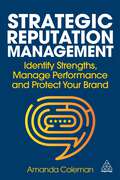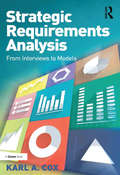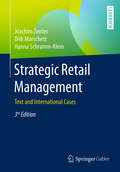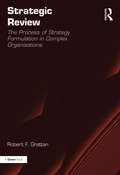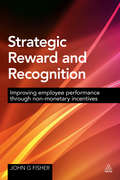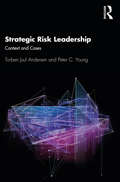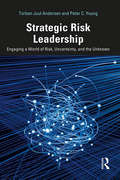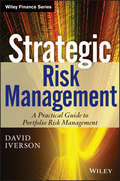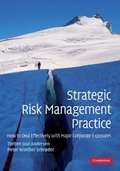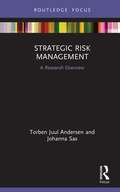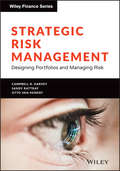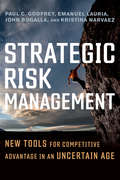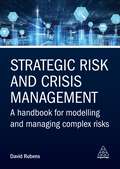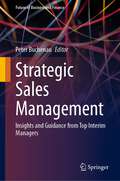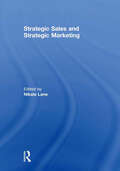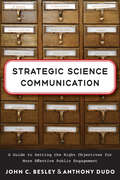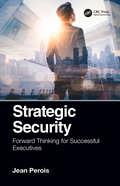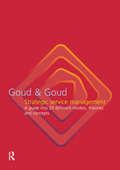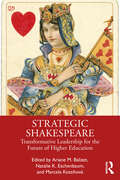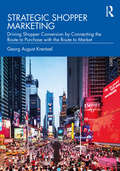- Table View
- List View
Strategic Reputation Management: Identify Strengths, Manage Performance and Protect Your Brand
by Amanda ColemanIn today's hyper-connected world, reputation is everything. This book explores the role of reputation management within your organization, providing the latest insights and strategies to help you navigate it.Strategic Reputation Management is a practical guide that equips PR and communication professionals with the tools they need to navigate the complexities of reputation management effectively. With a wealth of practical tips and strategies, readers will gain the knowledge and expertise needed to enhance or build their organization's reputation.Using real-world examples and expert interviews, this book will look at reputation management both before, during and after a crisis. It will consider how to establish a positive reputation, to maintain it when under pressure and to turn a bad reputation around after problems have occurred. It will also include top tips, checklists and outline a new framework for reputation management.Strategic Reputation Management is a must-read for anyone seeking to understand, manage and master the intricate world of reputation management.
Strategic Requirements Analysis: From Interviews to Models
by Karl A. CoxA strategic requirement is something an organisation sets out to achieve; it could be the long-term vision the organisation sets itself, the key business condition for a specific project to be a success or a business strategy to achieve a goal. A set of strategic requirements defines the goals, strategies and tactics that organisations need to put in place to give them direction and impetus. Business analysts and consultants have to understand strategic requirements to know where projects can deliver business benefits and where not. The ability of the analyst to interview, gather, analyse, model and present strategic requirements is key to success. The primary tool consultants and business analysts use for communication is talking; but, if you cannot present all that incredible information back to your client effectively, it is hard for them and you to get to grips quickly enough with what is going on. Being able to present a model is really powerful because it provides a visual format and structure on one page to reason about those strategic requirements. Dr Karl A. Cox offers a process, guidelines and ideas - that have been tried and tested in practice - for conducting interviews and shows you how to rapidly turn interview findings into strategic requirements models all on one page, to present to your clients, customers, team and / or supervisors.
Strategic Retail Management
by Dirk Morschett Hanna Schramm-Klein Joachim ZentesThis book is devoted to the dynamic development of retailing. The focus is on various strategy concepts adopted by retailing companies and their implementation in practice. This is not a traditional textbook or collection of case studies; it aims to demonstrate the complex and manifold questions of retail management in the form of twenty lessons, where each lesson provides a thematic overview of key issues and illustrates them via a comprehensive case study. The examples are all internationally known retail companies, to facilitate an understanding of what is involved in strategic retail management and illustrate best practices. In the third edition, all chapters were revised and updated. Two new chapters were added to treat topics like corporate social responsibility as well as marketing communication. All case studies were replaced by new ones to reflect the most recent developments. Well-known retail companies from different countries, like Tesco, Zalando, Hugo Boss, Carrefour, Amazon, Otto Group, are now used to illustrate particular aspects of retail management.
Strategic Review at Egon Zehnder International (A)
by Ashish Nanda Kelley MorrellThe case describes the history of the executive search firm Egon Zehnder International (EZI) from its inception through 2000. Internal and environmental changes lead EZI leaders to question whether the firm might be at an inflection point in its history. The EZI executive committee contemplates whether and how to engage in a strategy review process.
Strategic Review at Egon Zehnder International (B)
by Ashish Nanda Kelley MorrellSupplements the (A) case.
Strategic Review at Egon Zehnder International (C)
by Ashish Nanda Kelley MorrellSupplements the (A) case.
Strategic Review: The Process of Strategy Formulation in Complex Organisations
by Robert F. GrattanFollowing careers in the military and in industry, Robert Grattan has devoted himself to the subject of strategy and its related theory through his research into the strategy implementation employed by business, governments and the military. Strategy process is widely studied and taught but, argues Robert Grattan, comprehensive prescriptive theories have yet to be developed. This book is based on analysis of the strategic defence review (SDR) conducted by the UK Ministry of Defence, the methodology for which has been employed in other countries. The study focuses on how the review was managed through the twin lenses of strategic business management theory and the 'Essence of Decision' theory of governmental decision-making closely associated with the John F. Kennedy School of Government in the USA. The author has been fortunate in being granted interviews with the leading figures in Government, the Civil Service and the Military who participated in the SDR process and in having gained access to information in Ministry of Defence files under Freedom of Information legislation. The result is Strategic Review, a book that provides vivid insights into what happened in a large complex organisation during a major strategic review and highlights the problems likely to be encountered during the process of formulating strategy in business, in government, in sport and any other human endeavour. It will appeal to many in business intrigued by the similarities between the issues facing business and military strategists; to those involved in public policy-making; to the defence community; and to academics and higher level students with an interest in this rich field of study.
Strategic Reward and Recognition
by John G FisherNon-monetary incentives and recognition programmes are an area of employee motivation that is often overlooked. Yet, as Fisher's book reveals, a strategic focus on non-cash rewards can generate significant return on investment in terms of employee engagement, performance improvement and financial results. In the present economic context, with companies pushing to deliver more for less, it is a particularly pertinent issue. Strategic Reward and Recognition brings together theory and practice to guide HR professionals, consultants and senior leaders in developing the most effective programmes for their organizations. It features examples of good practice from all over the world, from different sectors and from both large and small organizations, providing coverage of digital as well as in-person schemes.
Strategic Risk Leadership: Context and Cases
by Torben Juul Andersen Peter C. YoungThis casebook extends Strategic Risk Leadership: Engaging a World of Risk, Uncertainty and the Unknown, bringing theory and practice grounded in the first book to life with an array of applicable, real-world examples. The book enables critical thinking about the current state of risk management and ERM, demonstrating contemporary shortcomings and challenges from real-life cases drawn from a global selection of well-known organizations. It confronts modern risk management practices and discusses what leaders should do to deal with unpredictable environments. Providing a basis for developing more effective risk management approaches, the book identifies shortcomings of contemporary approaches to risk management and specifies how to deal with the major risks we face today, illuminated by a variety of comprehensive global examples. It also provides valuable insights on these approaches for managers and leaders in general—including risk executives and chief risk officers—as well as advanced risk management students. End-of-chapter cases illustrate both good and bad risk management approaches as useful inspiration for reflective risk leaders. This book will be a hugely valuable resource for those studying or teaching risk management.
Strategic Risk Leadership: Engaging a World of Risk, Uncertainty, and the Unknown
by Torben Juul Andersen Peter C. YoungModern risk management as practiced today faces significant obstacles—we argue—primarily due to the fundamental premise of the concept itself. It asserts that we are mainly dealing with measurable, quantifiable risks and that we can manage the uncontrollable by relying on formal control-based systems, which has produced a general view that (enterprise) risk management is a technical-scientific discipline. Strategic Risk Leadership offers a critique of the status quo, and encourages leaders, executives, and chief risk officers to find fresh approaches that can help them deal more proactively with what the future may hold. The book provides an overview of the history of risk management and current risk governance approaches as prescribed by leading risk management standards, such as COSO and ISO31000. This enables practitioners to challenge the frameworks and improve their adoption in practice introducing sustainable resilience as a (more) meaningful response to uncertain and unknowable conditions. The book shows how traditional thinking downplays the significance of human behavior and judgmental biases as key elements of major organizational exposures illustrated and explained through numerous case examples and studies. This book is essential reading for strategic risk managers to understand the requirements for effective risk governance practices in the contemporary and rapidly changing global risk landscape. Indeed, it is a valuable resource for all risk executives, leaders, and chief risk officers, as well as advanced students of risk management.
Strategic Risk Management
by David IversonA comprehensive guide to the key investment decisions all investors must make and how to manage the risk that entailsSince all investors seek maximize returns balanced against acceptable risks, successful investment management is all about successful risk management. Strategic Risk Management uses that reality as a starting point, showing investors how to make risk management a process rather than just another tool in the investor's kit. The book highlights and explains primary investment risks and shows readers how to manage them across the key areas of any fund, including investment objectives, asset allocation, asset class strategy, and manager selection. With a strong focus on risk management at the time of asset allocation and at the time of implementation, the book offers important guidance for managers of benefit plans, endowments, defined contribution schemes, and family trusts.Offers a thorough examination of the role of risk management in the decision-making process for asset allocation, manager selection, and other duties of fund managersWritten by the current head of portfolio design for the New Zealand Superannuation FundAddresses the fundamental importance of risk management in today's post-crisis fund management landscapeStrategic Risk Management is a comprehensive and easy-to-read guide that identifies the primary risks investors face and reveals how best to manage them.
Strategic Risk Management Practice
by Torben Juul Andersen Peter Winther SchrøderAt a time when corporate scandals and major financial failures dominate newspaper headlines, the importance of good risk management practices has never been more obvious. The absence or mismanagement of such practices can have devastating effects on exposed organizations and the wider economy (Barings Bank, Enron, Lehmann Brothers, Northern Rock, to name but a few). Today's organizations and corporate leaders must learn the lessons of such failures by developing practices to deal effectively with risk. This book is an important step towards this end. Written from a European perspective, it brings together ideas, concepts and practices developed in various risk markets and academic fields to provide a much-needed overview of different approaches to risk management. It critiques prevailing enterprise risk management frameworks (ERMs) and proposes a suitable alternative. Combining academic rigour and practical experience, this is an important resource for graduate students and professionals concerned with strategic risk management.
Strategic Risk Management Practice
by Torben Juul Andersen Peter Winther SchrøderAt a time when corporate scandals and major financial failures dominate newspaper headlines, the importance of good risk management practices has never been more obvious. The absence or mismanagement of such practices can have devastating effects on exposed organizations and the wider economy (Barings Bank, Enron, Lehmann Brothers, Northern Rock, to name but a few). Today's organizations and corporate leaders must learn the lessons of such failures by developing practices to deal effectively with risk. This book is an important step towards this end. Written from a European perspective, it brings together ideas, concepts and practices developed in various risk markets and academic fields to provide a much-needed overview of different approaches to risk management. It critiques prevailing enterprise risk management frameworks (ERMs) and proposes a suitable alternative. Combining academic rigour and practical experience, this is an important resource for graduate students and professionals concerned with strategic risk management.
Strategic Risk Management: A Research Overview (State of the Art in Business Research)
by Torben Juul Andersen Johanna SaxOrganizations face challenges in adapting their current business and operational activities to dynamic contexts. Successful companies share a common characteristic of dealing with the emergent risks and threats in responses that generate viable solutions. Strategic risk management (SRM) is a multidisciplinary and rather fractured field of study, which creates significant challenges for research. This short-form book provides an expert overview of the topic, providing insight into the theory and practice. Essential reading for strategic management researchers, the authors frame the fundamental principles, emerging challenges and responses for the future, which will also provide valuable insights for adjacent business disciplines and beyond.
Strategic Risk Management: Designing Portfolios and Managing Risk (Wiley Finance)
by Campbell R. Harvey Sandy Rattray Otto Van HemertSTRATEGIC RISK MANAGEMENT Having just experienced a global pandemic that sent equity markets into a tailspin in March 2020, risk management is a more relevant topic than ever. It remains, however, an often poorly understood afterthought. Many portfolios are designed without any thought given to risk management before they are handed off to a dedicated—but separate—risk management team.In Strategic Risk Management: Designing Portfolios and Managing Risk, Campbell R. Harvey, Sandy Rattray, and Otto Van Hemert deliver a reimagining of the risk management process. The book envisions a marriage between the investment and risk processes, an approach that has proven successful at the world’s largest publicly listed hedge fund, Man Group.The authors provide readers with a new framework for portfolio design that includes defensive strategies, drawdown risk controls, volatility targeting, and actively timing rebalancing trades. You will learn about how the book’s new approach to risk management fared during the recent market drawdown at the height of the COVID-19 pandemic. You will also discover why the traditional risk weighting approach only works on certain classes of assets.The book shows you how to accurately evaluate the costs of defensive strategies and which ones offer the best and most cost-effective protection against market downturns. Finally, you will learn how to obtain a more balanced return stream by targeting volatility rather than a constant notional exposure and gain a deeper understanding of concepts like portfolio rebalancing.Perfect for people working in the asset management industry and financial policy makers, Strategic Risk Management: Designing Portfolios and Managing Risk will also earn a place in the libraries of economics and finance scholars, as well as casual readers who take an active approach to investing in their savings or pension assets.PRAISE FOR STRATEGIC RISK MANAGEMENT“Strategic Risk Management shows how to fully embed risk management into the portfolio management process as an equal partner to alpha. This should clearly be best practice for all asset managers.”—Jase Auby, Chief Investment Officer, the Teacher Retirement System of Texas“This book shows the power of integrating risk and investment management, rather than applying risk management as an afterthought to satisfy set limits. I was pleased to shepherd some of the key ideas in this book through the publication process at The Journal of Portfolio Management.”—Frank J. Fabozzi, Editor, The Journal of Portfolio Management“Financial markets today are quite different from those of the last century. Understanding leverage, correlations, tails, and other risk parameters of a portfolio is at least as important as work on signals and alpha. In that sense, bringing risk management from ‘control’ to ‘front office’ should be a priority for asset managers. This book explains how to do it.”—Marko Kolanovic, Chief Global Market Strategist, J.P. MorganA powerful new approach to risk management in volatile and uncertain marketsWhile the COVID-19 pandemic threw the importance of effective risk management into sharp relief, many investment firms hang on to a traditional and outdated model of risk management. Using siloed and independent portfolio management and risk monitoring teams, these firms miss out on the opportunities presented by integrated risk management.Strategic Risk Management: Designing Portfolios and Managing Risk delivers a fresh approach to risk management in difficult market conditions. The accomplished author team advocates for the amalgamation of portfolio design and risk monitoring teams, incorporating risk management into every aspect of portfolio design.The book provides a roadmap for the cr
Strategic Risk Management: New Tools for Competitive Advantage in an Uncertain Age
by Paul C. Godfrey Kristina Narvaez Emanuel Lauria John BugallaThis book presents a new approach to risk management that enables executives to think systematically and strategically about future risks and deal proactively with threats to their competitive advantages in an ever more volatile, uncertain, complex, and ambiguous world.Organizations typically manage risks through traditional tools such as insurance and risk mitigation; some employ enterprise risk management, which looks at risk holistically throughout the organization. But these tools tend to focus organizational attention on past actions and compliance. Executives need to tackle risk head-on as an integral part of their strategic planning process, not by looking in the rearview mirror. Strategic Risk Management (SRM) is a forward-looking approach that helps teams anticipate events or exposures that fundamentally threaten or enhance a firm's position. The authors, experts in both business strategy and risk management, define strategic risks and show how they differ from operational risks. They offer a road map that describes architectural elements of SRM (knowledge, principles, structures, and tools) to show how leaders can integrate them to effectively design and implement a future-facing SRM program. SRM gives organizations a competitive advantage over those stuck in outdated risk management practices. For the first time, it enables them to look squarely out the front windshield.
Strategic Risk and Crisis Management: A Handbook for Modelling and Managing Complex Risks
by David RubensFrom natural disasters to cyber-attacks to global pandemics, the modern risk environment is highly complex and challenges our fundamental understanding of risk and crisis management. All senior risk and crisis managers face a similar challenge: maximizing their organization's ability to prepare for a potential high-impact event. Blending practical insights with rigorous research, Strategic Risk and Crisis Management provides a range of realistic solutions for any operational environment. It introduces concepts, frameworks and processes that will allow businesses to not only survive but respond and recover at a time of maximum chaos and confusion. Authored by a recognized global authority on the strategic management of complex events, the book covers the integration of multiple stakeholders and the importance of information exchange and critical decision-making under pressure at strategic, tactical and operational levels. It also includes material on leadership, sense-making, resilience, wicked problems and the challenges of global urban resilience, as well as case studies with detailed analysis of organizational failures and the lessons learned, including COVID-19, the WannaCry attack, the Texas snowstorm, and the Gatwick Airport Drone Incident. Strategic Risk and Crisis Management is an essential read for professionals working in security, risk, crisis management and emergency response. It will also be a valuable text for university students taking modules on security, risk, emergency response and crisis management.
Strategic Sales Management: A Boardroom Issue
by Adrian J. Slywotzky Benson P. Shapiro Stephen X. DoyleExplains why sales management has become an increasingly important and complex topic for top managers. Demonstrates the financial impact of a superior salesforce and then describes a way to gain superiority. The focus is on a salesforce that is responsive to customer needs and competing imperatives. Organization and management receive careful attention.
Strategic Sales Management: Insights and Guidance from Top Interim Managers (Future of Business and Finance)
by Peter BuchenauSales is a CEO's job, or at least it should be. But many entrepreneurs and managers come from other disciplines such as legal, production or product marketing – or they may have inherited the business. In most companies, a sales director is responsible for the operational management of the sales department. However, sales also need to be considered strategically, in terms of the business, the products or even the target market, for which many entrepreneurs or sales managers unfortunately lack the time or even the knowledge.In this book, experienced interim managers reveal the most important and necessary strategic methods and approaches to maintain and lead competitiveness for years to come. Readers will benefit from the first-hand insights of prominent and internationally experienced interim managers such as Ulvi Aydin, Uwe Brüggemann, Michael Eckardt, Ulrich Girrbach, Elmar Gorich, Ralf Komor, Peter Kuhle, Siegfried Lettmann, Thomas Mertens, Stephan Rohe, Rainer Simmoleit and Stefan Zeiss. Practitioners and MBA students in particular will benefit from these insights into what makes strategic sales management successful.
Strategic Sales and Strategic Marketing
by Nikala LaneThere is growing evidence that the traditional role of the sales organization in business-to-business marketing is quickly evolving from a tactical, operational function to a strategic capability concerned with the management of critical processes that support business strategy and deliver value to profitable customers. This topic is of major relevance to scholars in both the sales and marketing domains, and this relevance is underlined by the intense interest of managers and companies in how this field is changing. This collection is a unique gathering of views on the critical issues to be confronted in the strategizing of the sales function, from distinguished scholars from throughout the world. Their focus is on the linkages between strategic marketing and the corollary of strategic sales. This book was published as a special issue of Journal of Strategic Marketing.
Strategic Science Communication: A Guide to Setting the Right Objectives for More Effective Public Engagement
by Anthony Dudo John C. BesleyWhat tactics can effective science communicators use to reach a wide audience and achieve their goals?Effective science communication—the type that can drive behavior change while boosting the likelihood that people will turn to science when faced with challenges—is not simply a matter of utilizing social media or employing innovative tactics like nudges. Even more important for success is building long-term strategic paths to achieve well-articulated goals. Smart science communicators also want to create communication opportunities to improve their own thinking and behavior.In this guidebook, John C. Besley and Anthony Dudo encapsulate their practical expertise in 11 evidence-based principles of strategic science communication. Among other things, science communicators, they argue, should strive to seem competent, warm, honest, and willing to listen. Their work should also convey a desire to make the world a better place. Highlighting time-tested methods for building rapport with an audience through several modes of communication, Besley and Dudo explain how to achieve each strategic objective. All scientific communication is goal-oriented, and Besley and Dudo discuss the importance of recognizing the right goals, then employing strategic and tactical communication in order to achieve them. Finally, they offer specific suggestions for how practitioners can evaluate the effectiveness of their communications (and in fact, build evaluation into their plans from the beginning).Strategic Science Communication is the first book to use social science to help scientists and professional science communicators become more evidence-based. Besley and Dudo draw on insightful research into the science of science communication to provide readers with an opportunity to think more deeply about how to make communication choices. This guidebook is essential reading for all professionals in the field.
Strategic Security: Forward Thinking for Successful Executives
by Jean PeroisStrategic Security will help security managers, and those aspiring to the position, to think strategically about their job, the culture of their workplace, and the nature of security planning and implementation. Security professionals tend to focus on the immediate (the urgent) rather than the important and essential—too often serving as "firefighters" rather than strategists. This book will help professionals consider their roles, and structure their tasks through a strategic approach without neglecting their career objectives. Few security management books for professionals in the field focus on corporate or industrial security from a strategic perspective. Books on the market normally provide "recipes," methods or guidelines to develop, plans, policies or procedures. However, many do so without taking into account the personal element that is supposed to apply these methods. In this book, the authors helps readers to consider their own career development in parallel with establishing their organisation security programme. This is fundamental to becoming, and serving as, a quality, effective manager. The element of considering career objectives as part-and-parcel to this is both unique to only this book and vital for long-term career success. The author delineates what makes strategic thinking different in a corporate and security environment. While strategy is crucial in the running of a company, the traditional attitude towards security is that it has to fix issues quickly and at low cost. This is an attitude that no other department would tolerate, but because of its image, security departments sometimes have major issues with buy-in and from top-management. The book covers the necessary level of strategic thinking to put their ideas into practice. Once this is achieved, the strategic process is explained, including the need to build the different steps into this process—and into the overarching business goals of the organisation—will be demonstrated. The book provides numerous hand-on examples of how to formulate and execute the strategic master plan for the organization. The authors draws on his extensive experience and successes to serve as a valuable resource to all security professionals looking to advance their careers in the field.
Strategic Service Management: A Guide into 20 Different Models, Theories and Concepts
by Bettie M.J. Goud Aart P.J. GoudServices comprise about 70% of the BNP in most Western societies. Services surround us each and every day and include such sectors as medical, IT, financial, travel, telecommunication and educational. This book is about services and has been written for service managers and practitioners as well as students who aim to move into those areas. The book outlines the fundamental issues of service and service management - offering support by discussing some twenty different business administration models. Real-world examples from both non-profit and for-profit sectors are used throughout the book as well as "what to do" summaries. This text provides an excellent introduction to service management for students of marketing, economics, business administration, hospitality management and other courses.
Strategic Shakespeare: Transformative Leadership for the Future of Higher Education
by Marcela Kostihová Natalie K. Eschenbaum Ariane M. BalizetStrategic Shakespeare demonstrates the value of humanities-trained scholars as leaders in higher education. It features contributions from Renaissance and Shakespearean scholars in leadership roles in North American higher education, who collectively aim to leverage traditional assumptions about Shakespeare in the service of a more inclusive and sustainable academy.Making a powerful case for the liberal arts, the contributors demonstrate ways in which training in the humanities creates a baseline of skills in collaboration, deep listening, tolerance for ambiguity, and a range of positionalities. They also illustrate an astute understanding of disparate data sets, persuasive storytelling, and a commitment to liberal arts education. As this innovative collection showcases, these skills are crucial in the current climate, as higher education struggles with declining enrolments, decreasing budgets, growing public distrust, and (often) hostile legislative oversight. Additionally, the skills help us navigate a rapidly shifting landscape of learning in the aftermath of the COVID-19 pandemic and entry of generative artificial intelligence (AI) to the public sphere. The collection presents theoretical arguments, case studies, personal narratives, and practical advice related to how humanities-trained scholars have led and must continue to lead the academy through transformative change.Strategic Shakespeare is an essential tool for anyone interested in learning from university leaders who have made good things happen on their campuses, in their communities, and in the profession. It celebrates and foregrounds the core adaptive skills that humanities scholars bring to the table, showcasing their unique predisposition for successful academic leadership during a time of unprecedented change.
Strategic Shopper Marketing: Driving Shopper Conversion by Connecting the Route to Purchase with the Route to Market
by Georg August KrentzelStrategic Shopper Marketing provides a uniquely strategic perspective on the “anything, anywhere, anytime” retail revolution. Following the principles set out by leading global consultant Georg August Krentzel, a practitioner can connect shopper marketing principles with strategic concerns, aligning it with other disciplines like marketing, sales and distribution to connect their route to purchase with their route to market. Providing professionals with a theoretically well-founded understanding of shopper marketing, the book charts the history and development of shopper marketing and describes the newest developments and changes in the marketplace that impact how shoppers need to be activated to generate profitable sales and loyalty. The book presents a guideline with examples and numerous illustrations to develop successful shopper marketing strategies across different sales channels. Focused on practice, but with solid theoretical foundations, practical insights and methodologies, and enriched with examples, this book is ideal for marketing practitioners at strategic levels looking to integrate shopper marketing principles into their organization, as well as for those less experienced practitioners learning the principles, and those in marketing education.
